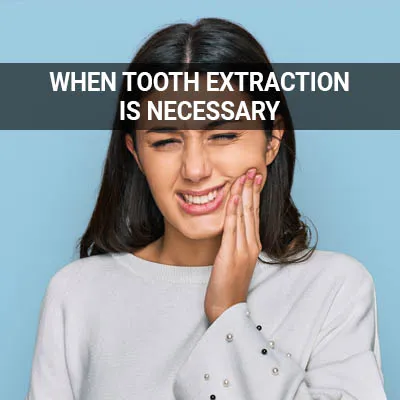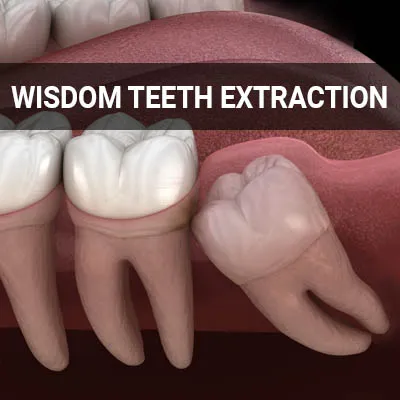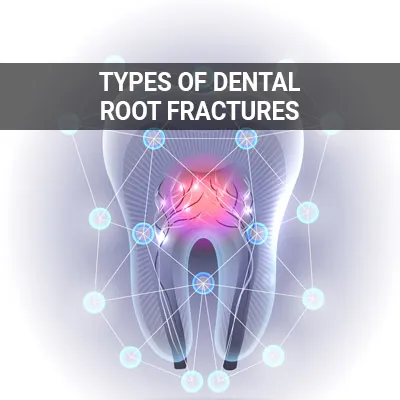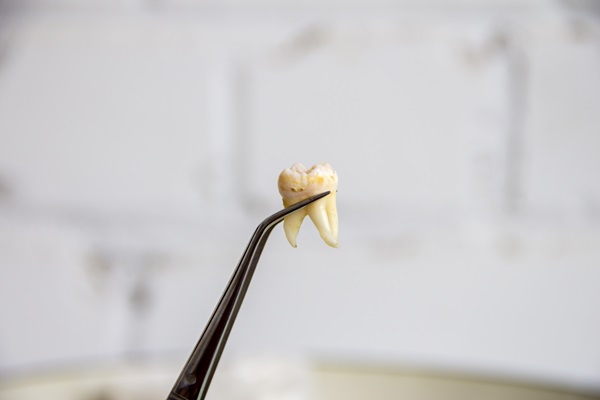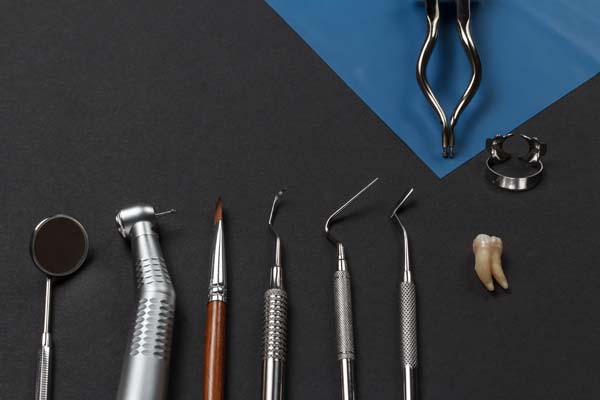Tooth Extraction Los Angeles, CA
A tooth extraction can be an essential part of maintaining one's dental health. Contrary to popular belief, wisdom teeth are not the only teeth that may need extraction. Tooth extraction can improve the overall functioning of the mouth.
Tooth extraction is available at Dr. Robert B Tamaki, DDS in Los Angeles and the surrounding area. Many patients find that tooth extraction relieves them of unnecessary pain and restores their quality of life. Call us today at (310) 402-0156 to learn more and schedule an appointment.
Reasons for Tooth Extraction
Teeth may require extraction if they have suffered damage beyond repair, either through trauma or decay. Other factors that may necessitate tooth extraction include overcrowding, infection, and risk of infection. Typically, tooth extraction for overcrowding occurs when preparing the mouth for braces. Braces are meant to realign the teeth, meaning teeth must have adequate space to move around. A tooth extraction may also occur as part of the orthodontic process if there are teeth that do not have enough room to erupt through the gum.
Teeth may become infected when decay or damage extends to the pulp (the nerves and blood vessels at the center of the tooth). Root canal therapy is often enough to treat this problem. However, tooth infections may become severe enough to require extraction and prevent them from spreading any further. Patients who are immunocompromised may need to have teeth removed even if they are just at risk of infection.
” Teeth may require extraction if they have suffered damage beyond repair, either through trauma or decay.”
Preparing for Tooth Extraction
The first step to getting a tooth extraction is an initial consultation. During this time, patients should go over their medical history with their dentist, along with any other treatments they have planned. They should also tell their doctor about any medications, vitamins, supplements, and over-the-counter drugs they are taking. To ensure the patient's health, our team will take X-rays before the extraction and prescribe the patient antibiotics beforehand if necessary. Patients may be prescribed antibiotics if they have an infection, a weakened immune system, or specific medical conditions. The doctor may also prescribe antibiotics for patients who will undergo particularly long procedures.
Patients should wear loose, short-sleeved clothing on the day of the procedure. Additionally, they should refrain from eating or drinking for six to eight hours and refrain from smoking for 12 hours before their appointment. Patients should notify the office immediately if they have a cold, nausea, or vomiting, as this may necessitate rescheduling or use of a different form of anesthesia than initially planned. Those undergoing general anesthesia should make arrangements to have a trusted adult drive them to and from the procedure.
“To ensure the patient’s health, our team will take X-rays before the extraction and prescribe the patient antibiotics beforehand if necessary.”
What to Expect During Tooth Extraction
Before the procedure, the dentist will inject the patient with an anesthetic to numb the area from which they will be removing the tooth. As a result, patients will feel no pain throughout the extraction. Extraction of an impacted tooth will involve cutting away any gum and bone tissue covering the tooth. Since blood clots usually follow extraction, patients may have to bite down on a gauze pad packed to stop the bleeding. We may also place some sutures over the extraction site to assist in closing the gum edges.
“Before the procedure, the dentist will inject the patient with an anesthetic to numb the area from which they will be removing the tooth.”
Check out what others are saying about our dental services on Yelp: Tooth Extraction in Los Angeles, CA
Post-Extraction Care
Following any extraction procedure, we provide patients with after-care instructions for a safe and fast recovery. The blood clot present after an extraction is intended to keep the site covered and prevent dry mouth or dry socket. Furthermore, the initial gauze placed after the extraction should be kept in the mouth for a few hours to help with forming the blood clot.
After the first few hours, the numbing agent will start wearing off. Patients are prescribed pain killers, antibiotics, and anti-inflammatory medications to alleviate discomfort and help fight infection. It is important to avoid rinsing, spitting, sneezing, smoking, using straws, and blowing the nose until the extraction site has healed. The extraction site must remain clean at all times by changing the gauze and using a saltwater solution. Merely have the saltwater clean the site; do not rinse harshly.
“It is important to avoid rinsing, spitting, sneezing, smoking, using straws, and blowing the nose until the extraction site has healed.”
Questions Answered on This Page
Q. Do I need a tooth extraction?
Q. How will my doctor help me prepare for my tooth extraction?
Q. What happens during a tooth extraction procedure?
Q. Are there any risks associated with tooth extractions?
Q. What should I do after a tooth extraction?
People Also Ask
Q. How do I begin preparing for wisdom teeth extraction?
Q. What are some of the reasons one might need a tooth extraction?
Q. Why is routine dental care important?
Q. Why is stopping infection from spreading important?
Q. What happens during a routine dental checkup?
What to Know Before Tooth Extractions
Tooth extraction is generally a safe procedure. Additionally, our team will not recommend a treatment unless the benefits outweigh the risks. However, it is still important to be aware of potential complications. Typically, after a tooth extraction, a blood clot will form in the socket left behind. However, when this blood clot does not form or is prematurely dislodged, then the bone inside the socket may be exposed. This condition is known as "dry socket."
Symptoms include severe and radiating pain, visible bone, bad breath, and foul taste. We can treat this condition easily by putting a new, sedative dressing over the socket for a few days to allow a new clot to form. Additionally, patients should watch out for bleeding that lasts longer than 12 hours, chest pain, cough, nausea, severe fever and chills, shortness of breath, swelling and redness at the surgical site, and vomiting. If any of these symptoms occur, call our office immediately.
“We will not recommend a treatment unless the benefits outweigh the risks.”
Frequently Asked Questions
Q. How long does the pain last after an extraction?
A. Recovering from an extraction varies from patient to patient, but healing time generally lasts from one to two weeks. Pain stemming from the extraction site may be present for the first 48-72 hours, but patients should take their medications as prescribed to reduce pain and aid with healing. Patients experiencing pain that lasts longer than two weeks should immediately call us to schedule a follow-up appointment.
Q. Will I need any other appointments following the extraction procedure?
A. In most cases, we like to schedule a follow-up appointment with all patients who have undergone an extraction. Whether the procedure was minor or severe, blood clots can dislodge without a patient realizing, and other complications may not exhibit signs. During the follow-up, we will check the extraction site, clean it thoroughly, and discuss possible tooth replacement options.
Q. Are wisdom teeth always extracted?
A. Wisdom teeth only need to be extracted when they are impacted, causing pain or pressure, or are pushing inwards to the neighboring teeth. In most cases, these signs are evident when the wisdom teeth first erupt, but they may become apparent later in adulthood as well. We will discuss whether a patient should remove their wisdom teeth when it becomes necessary.
Q. How much do extractions cost?
A. Each extraction procedure is different and will vary in cost. We encourage patients to speak with their insurance provider to better understand their plan and coverage. We can also work with patients to figure out a payment option that works best for them.
Q. What happens if I have a complication after an extraction?
A. Most complications that arise after an extraction can be treated. In cases of dry socket, we can thoroughly flush out the infection and apply a medicated dressing to seal the hole. For other complications, there may be a treatment or surgery that follows to treat the condition and keep the oral cavity healthy.
Dental Terminology
Learn More Today
For many patients, tooth extraction can help reverse the damage done by trauma and decay. We at Dr. Robert B Tamaki, DDS may be able to help. Call us today at 310-402-0156 to learn more and schedule an appointment.
Helpful Related Links
- American Dental Association (ADA). Glossary of Dental Clinical Terms. 2024
- American Academy of Cosmetic Dentistry® (AACD). Home Page. 2024
- WebMD. WebMD’s Oral Care Guide. 2024
About our business, license, and website security
- Dr. Robert B Tamaki, DDS was established in 1985.
- We accept the following payment methods: Cash, CareCredit, Check, MasterCard, and Visa
- We serve patients from the following counties: Los Angeles County
- We serve patients from the following cities: Los Angeles, Santa Monica, Venice, Marina Del Rey, Redondo Beach, Hermosa Beach, Manhattan Beach, and Westchester
- CA (License #DDO-33386). View License Information and Specifics
- National Provider Identifier Database (1568559011). View NPI Registry Information
- Healthgrades. View Background Information and Reviews
- Norton Safe Web. View Details
- Trend Micro Site Safety Center. View Details
Back to top of Tooth Extraction



